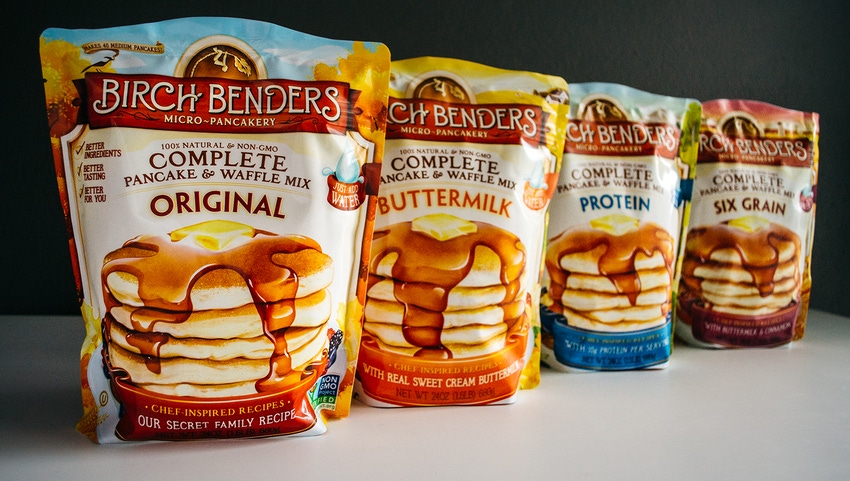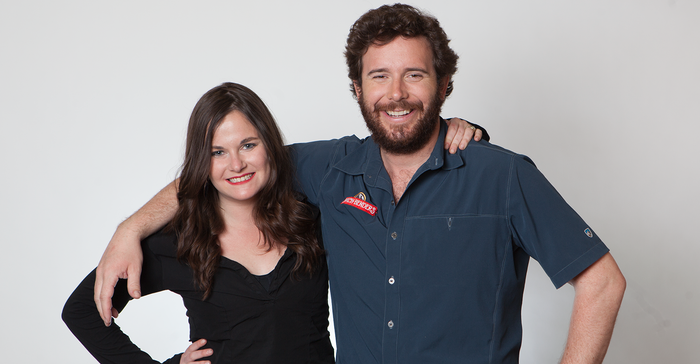Two young Colorado food entrepreneurs share how they built a better-for-you pancake mix brand from the ground up.

Matt LaCasse and Lizzi Ackerman love pancakes, but they couldn’t find a “just-add-water” mix without what Ackerman calls "junky ingredients." So, they set out to make a tasty, healthy and convenient pancake mix. From their home in Boulder, the millennial couple worked to sell their product at Boulder-area local Whole Foods Market stores, then at natural groceries in Colorado and beyond.
In just a few years, Birch Benders Micro-Pancakery has created 15 selections—including four organic options, a paleo blend, a gluten-free choice and a high-protein version—moved to north Denver and made its way onto shelves in 7,000 stores. Here, the two looked back at the beginning of Birch Benders and what they've learned along the way.
What was your biggest challenge as you started Birch Benders?
Matt LaCasse: One of the biggest challenges in starting a business is making sure you have the right product/market fit, and taking the time and being patient. One of the big urges once you have your product is to try to get it into every store in the country and blow up sales as quickly as possible. But it’s really important to take your time and make sure the product you have is the product people really want. When we were starting out, we got into five stores around the Boulder area and we would go do demos twice a day, every day. At that point, we thought we were doing demos to support sales, but what we were really doing was learning about the business, our brand, our product, our consumers and the industry. We would get consumer feedback during these demos and we would integrate consumer feedback into new iterations of our product. And we would do that for 18 months, until we really started to get traction.
Lizzi Ackerman: We learned so much. We learned what was resonating with people and what wasn’t. We used to sell it in jars, and you’d add water to the fill line, shake and pour. But people didn’t really get that; we’d always get the comment, “Why is the jar half empty?” There was a lot of confusion. Or people would say, “Well, what if I don’t want to make the whole thing at once?” We realized we needed to make the price more competitive and we needed to make the packaging more appealing. That was a long process.
Had we gotten into King Soopers locally with that product, it probably wouldn’t sell, and then we’d probably fail. If you get discontinued, it’s very, very, very hard to get back in again.
How did you approach retailers and get them to stock your product?
ML: We just showed up to the Whole Foods on Pearl Street in Boulder; 22-year-old kids saying, “Will you sell our pancakes?” Whole Foods had a great local vendor program at that time, and they helped us get our product into the stores. When you’re selling to the natural channel—Whole Foods, Sprouts, Natural Grocers—it’s very much an emotional and relationship channel. The buyers are willing to take meetings with smaller companies and they’re willing to go out on the limb for your brand and give it a shot, which is really, really wonderful because it’s a great place to start growing your sales.
LA: There are all these great independents in California that we wanted to get into, so we drove to California ... We would show up, show them the product and try to get it in. It was fun; it was crazy.
ML: It was a lot of hustle, for sure.

What differentiates Birch Benders pancake mixes from the competition?
LA: Pancakes appealed to us because it was kind of a slow, lagging category. There wasn’t a lot of innovation. There were natural pancake mixes, but they were kind of really just glorified flour. You had to add an egg; you had to add milk. There was nothing that was convenient and just-add-water, and that appealed to us. In conventional, every pancake mix was just-add-water, but they were full of junky ingredients.
ML: We had the first-to-market paleo pancake mix, and we partnered with Whole Foods to create it. That has actually become the No. 1 most productive pancake mix in the natural channel nationwide. We have the top three most productive SKUs in natural, in terms of units per store per week.
LA: We also saw an opportunity to stand out in terms of branding. We poured our hearts out into the branding we have. We wanted to create packaging that’s whimsical, kind of gives a sense of happy nostalgia, harkening back to a simpler time. Each flavor kind of has a different world; we have different characters and different themes. We’ve put a lot more time and imagination into the packaging than the competitors have.
Tell us about the taste-testing you conducted as you created your pancake recipes.
LA: When we were starting Birch Benders, I was taking organic chemistry. I had this idea when we were developing the recipes: What if we do double-blind taste tests on every ingredient to figure out what is the best dried ingredient? I got that idea from being in the lab. Flour was where we started. Normally, if you are making pancakes, you grab the flour in your pantry. But we learned, the protein content dramatically affects the texture, the rise and the taste of the pancake. So we tried every kind of flour out there. We were really stunned by how much difference that made. We tried well over 30 organic flours of every variety; you’re not going to do that if you’re at home, and it really results in a better-tasting pancake.
ML: We proceeded to do that with every ingredient that we used. For our chocolate chip pancake mix, we taste tested, double-blind, every organic chocolate chip on the market. Someone’s got to do the tough research there. It’s incredibly delicious and it makes for the perfect chocolate chip pancake. We get the comments, “Oh my gosh, your pancakes are even better than the pancakes we make from scratch,” and that’s because we’ve done all the research.
What advice do you have for other entrepreneurs?
ML: You don’t know what you don’t know. The best thing you can do is get your products out there, start testing them with consumers and get consumer feedback. See how the customers really feel about your product and if it has potential to sell in stores all over the country.
LA: We feel fortunate to have Naturally Boulder [a nonprofit that supports natural products brands on Colorado’s Front Range], to have that whole network; it’s just been really helpful and a great way to connect with mentors and advisers. We definitely have taken advantage of all of its services. When we started, we went to the six-hour seminar teaching you how to start a brand, and that was really, really helpful.
About the Author(s)
You May Also Like




